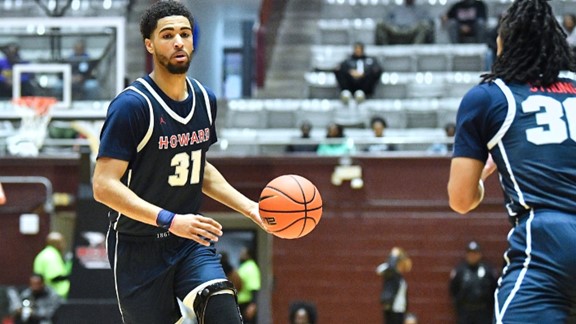Howard players shoot hoops while studying for Ph.D. and law degree

By DERON SNYDER (as published by theGrio)
Howard basketball players Seth Towns and Joshua Strong don’t have much in common at first glance.
Towns is a 6-foot-9 forward who was a highly recruited prep player out of Columbus, Ohio. He first attended Harvard, where as a sophomore he was Ivy League Player of the Year and AP All-America honorable mention.
Strong, from Brooklyn Park, Minnesota, is a 6-foot guard who wound up at Division II Minnesota-Duluth. He was sixth man as a freshman before starting 14 of 36 games as a sophomore, when his team advanced to the NCAA Elite 8.
The contrast in their background and acclaim is as noticeable as their height differential. But they’re similar in stretching “student-athlete” to the term’s maximum width while relishing that journey at an HBCU – Towns as a 26-year-old doctoral candidate and Strong as a 21-year-old law student.
Strong graduated high school with 58 college credits and earned his bachelor’s degree in two years, summa cum laude last spring. After gaining admission to Howard’s law school, he reached out to head basketball coach Kenny Blakeney about joining the team. He won Blakeney over by excelling at summer pickup games, but Howard Law was going to happen, regardless.
“I always had a passion for social justice,” Strong told the Washington Post. “I guess early I kind of conceptualized law as the way to attack that. I was always smart, and people would say, ‘Oh, you’re going to be a doctor, engineer.’ Well, how am I going to help Black people?”
Playing Division I basketball and studying law usually don’t mix, as each activity comes with heavy workloads and time commitments. But when Strong was in middle school, he read about Seton Hall’s Braden Anderson, who is believed to be the first Division I men’s basketball player to simultaneously attend law school.
“I just think that, like, you have to be strong-willed,” Strong said. “As a Black man, they’re going to try to break your will. … I’ve got to know what I believe. I need to be a lawyer so I can help my people.”
Towns is on a mission as well after injuries nearly ended his playing career.
Knee and back surgeries cost Towns his last two years at Harvard, where he earned an undergraduate degree. He transferred to his hometown school, Ohio State, and earned a master’s degree, but medical issues limited him to one season (2020-21) in three years. He voluntarily sat out last season, thinking his basketball days were behind him. Once an NBA prospect, he got the itch again last year and filed an NCAA waiver to play at Howard as an eighth-year senior.
“I think I have restructured my relationship with basketball,” Towns told The Columbus Dispatch. “It is much healthier now. I’m not saying I put my entire identity into basketball, but man, it was hard, because that’s kind of the only professional aspiration I’ve had. Everything else was kind of subsidiary to that. Now, I think I’ve released myself from the need to play at whatever level. I’m very grateful I’ll have another chance to play and I love the sport and all that, but I would say my connection to it isn’t as unhealthy as it was before.”
Enrolled in a doctoral program in English literature, Towns is the NCAA’s oldest basketball player. He said choosing his third school was an easy decision.
“I knew off jump that I wanted to go to Howard if I had any eligibility left,” he told Slam. “I feel like the value of something like attending an HBCU isn’t always seen clearly. It’s [ours] to build, ours to protect and ours to cultivate into this huge magical thing.”
Towns leads the team in rebounding (6.8 rpg) and assists (43), and he’s second in scoring (15.2 ppg.). He wants to help the Bison win the Mideastern Athletic Conference and reach their second consecutive NCAA tournament, but also wants to help with larger concerns outside of sports.
While playing at Ohio State in 2020, Towns kneeled during the national anthem after a childhood friend was shot and killed by a police officer. Earlier that year, Towns was handcuffed and taken into custody during a rally to protest George Floyd’s murder. Afterward, he stressed the need for activism.
“There is a huge dilemma in this country right now that needs to be addressed,” Towns said on ESPN. “I won’t shut up. I will continue to use my voice to speak out for the people who are unheard.
“Having a voice doesn’t even mean speaking,” he added during his three-minute appearance. “I’m talking about actions. Going out and performing your duty as a member of this democracy. Athletes have a unique platform to speak up for what’s wrong and be a voice of the people, but everyone has a responsibility in this.”
A sense of duty and the quest for Black excellence drew Towns and Strong to Howard (nicknamed “The Mecca”) after beginning their academic careers at Harvard and Minnesota-Duluth, where Black students are 6.21% and 2.11%, respectively, of the student body. “The HBCU experience has been everything I hoped it would be,” Towns told The Washington Post. “I’ve enjoyed the classes, but beyond that, I’ve really enjoyed just getting into discussions about everything that’s going on in the world. I’m learning all the time, and it invigorates me every day.”
 Follow
Follow
